7 easy ways to keep chickens safe from garden predators – expert advice for securing your coop and your flock
If you’ve got chickens in your garden, the last thing you want is to see them fall victim to sneaky predators
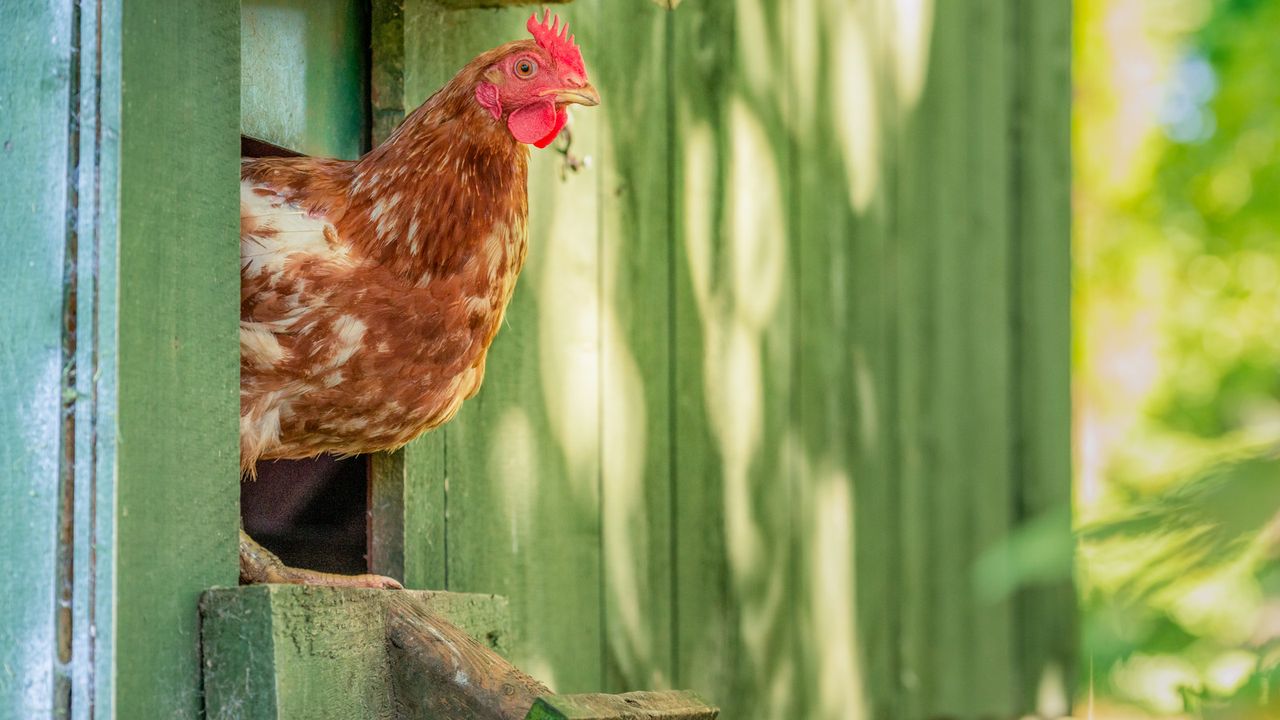

Wondering how to keep chickens safe from garden predators? You’re far from alone; it’s been reported that a whopping 12 million people in the US now keep chickens in their backyard.
Still, while there's few things so rewarding as fresh eggs from your own happy hens, its a pastime that also comes with its challenges – chief among them, keeping your flock safe from opportunistic predators.
Foxes, badgers, weasels, and even birds of prey are all known to target chickens, and trust us, they’re smarter and more determined than you’d think. That’s why, just as you should take extra care of your chickens in the winter, you should take your time securing their coop, too.
How to keep chickens safe from garden predators
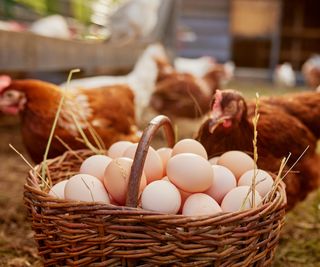
It just isn't enough to install a chicken coop and run as part of your backyard ideas – you need to take steps to keep your prized flock safe from hungry critters, too.
From predator-proof fencing to clever coop designs, we’re covering all the essential steps to make sure your beloved birds stay safe, happy, and exactly where they belong: in your garden, not on the menu.
'You, the flock keeper, think of your hens as beautiful and entertaining creatures pecking and scratching around your backyard. You've given them names – they are your pets, your babies,' says Randy Graham of Randy's Chicken Blog.
'Your local predators, on the other hand, think of them only as dinner. And, there are predators in every locality. So, it's up to you, the flock keeper, to keep your flock safe.'
Lisa Steele, a fifth generation chicken-keeper, cookbook author and host of the Create TV/ American Public Television series, Welcome To My Farm, agrees wholeheartedly with Randy, noting that predators can be found anywhere and everywhere.
'Most new chicken keepers underestimate predators,' she says. 'Even in urban and suburban areas, there are rodents, raccoon, and hawks, and sometimes even fox or coyotes. And, of course, there are dogs everywhere.'
Lisa adds: 'Protecting chickens from all potential predators, I think, is the only difficult part of raising chickens. Pretty much anything will eat a chicken.'
With that in mind then, how to keep chickens safe from predators? Here's what our experts advise.

Randy Graham lives on nine acres in Minnesota's St. Croix River Valley, a wild and protected river that forms much of the border between the states of Minnesota and Wisconsin. He shares his acreage with his wife, his cat, his dog, his flock of chickens, a few self-important domestic ducks, and more predators than you can imagine. He has designed his coops and runs in such a way that he has never lost a single chicken or duck to predators. All of the birds would give him a huge thumbs-up for his efforts... if only they had thumbs.

Dubbed 'Queen of the Coop', Lisa is a chicken lifestyle expert, a New Englander, born and bred, and a fifth-generation chicken keeper who grew up across the street from her grandparents' chicken farm. She spent her childhood raising chickens, rabbits, always an outdoor cat, and the occasional pet goat.
1. Embrace the cock-a-doodle-doo
Randy, who has yet to lose a single bird to one of the animals lurking in the nearby woods, knows a thing or two about how to keep chickens safe from predators. And his top tip? Get a rooster!
'One important predator deterrent that I strongly believe in is roosters,' he says.
'Roosters are programmed to protect their flock and they are constantly vigilant. If a predator lurks near the flock, the hens will all run for cover while the rooster calls the alarm and runs toward the predator. Roosters lay down their lives to save their hens.'
2. Secure the area
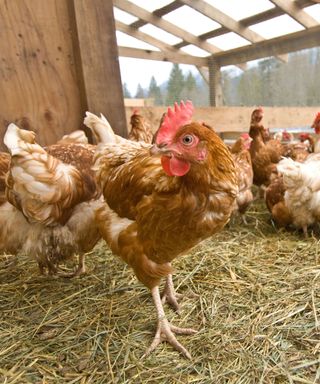
It doesn't matter how much space you have, it is vital to make sure that it is well fenced and secure from predators, day and night.
'To keep a flock completely safe, a secure pen constructed of 1" or smaller gauge welded wire with the fencing sunk into the ground about a foot to deter digging predators and also covered on top to prevent hawks and other aerial predators from gaining access is necessary,' advises Lisa.
If you prefer a more free range option, she suggests either a fenced in area, which might keep out dogs or fox, or – if you prefer to let your chickens wander wherever they please – she suggests adding a trained livestock guard dog.
'This, or another animal such as a donkey or geese, can help to protect free ranging chickens, but an enclosed pen is by far the safest option,' she stresses.
You should also take care to 'keep the run perimeter clear of weeds and underbrush,' says Randy Graham. 'And keep garbage and feed in secure metal containers, too.'
He adds that, 'predators won’t tarry in the open, but if there is cover they have lots of time to scope out the run and figure out ways over or under the run fence'. It's for this reason, too, that you should bury the fence at least a half-foot underground, and choose a fencing material that's strong with small openings.
'Chain link fencing is expensive but very strong. Hardware cloth is good. Chicken wire is not strong and will not keep predators out,' he stresses.
3. Pay attention to the coop floor
One of the more surprising rules in our guide? Never trust the floor.
'The coop floor is perhaps the most important part of the coop, since many predators attempt to enter the coop from below. A dirt floor is the least secure because many predators can tunnel,' explains Randy. 'The best, most secure floor is concrete, but a solidly built wooden floor is also secure and less expensive than concrete.'
Randy adds that, if you decide to elevate your coop, you should take care to raise it at least a couple of feet above the ground.
'Raising a wooden floored coop only a few inches off the ground creates a hiding space for small predators like rats and weasels to lurk and work their way through the floor,' he points out.
4. Lock the doors
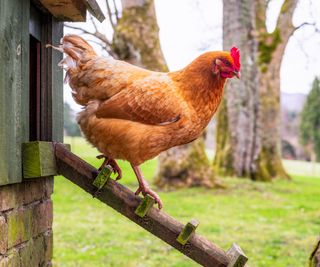
If you really want to keep chickens safe from predators, it's important to secure the doors of their coop, too.
'The door(s) need to have predator-proof locks on them, which means a padlock, spring-loaded hook or latch with a carabiner,' says Lisa. 'Remember; raccoons are smart and crafty, and can slide deadbolts and undo latches if they're not secure.'
Something like the Master Lock outdoor laminated padlock from Amazon should do the trick nicely.
Randy adds that even 'the most securely built coop is only secure if you vigilantly remember to close the doors each night'.
'If you are not always available to get the doors shut, or you are prone to forgetfulness, there’s a device for you! Electronic pop doors automatically close when it gets dark,' he says, noting that he himself as one and found it to be very reliable.
'In addition to the photosensor that closes the door at dusk, it also has a timer, so you can set it to close at a specific time.'
Something like the FarmLite automatic chicken coop door opener from Amazon, then, could prove an essential tool in protecting your chickens from hungry critters.
5. Cover the windows
It's vital you cover the windows of your coop if you want to keep your chickens safe from predators.
'Covering all the windows, vents and any other holes with 1/2" or smaller welded wire will keep out predators who try to get into the coop at night while the chickens are sleeping,' says Lisa.
Randy adds that 'half-inch hardware cloth is the best window covering material to use'.
'Chicken wire is good for containing chickens, but many predators have no trouble tearing right through it,' he points out.
6. Pop up DIY deterrents

If you really want to keep chickens safe from garden predators, there are a few things you can make at home that can help.
'Putting up scarecrows ( or scarehawks), hanging shiny CD's or flags on fishing line, playing a radio, and installing solar predator lights or motion-detector lights around the coop and run area can all help to deter predators,' says Lisa.
She adds that spraying something like wolf or mountain lion urine, available from Amazon 'can also help keep smaller predators out of the area, tricking them into believing it's a bigger animal's territory'.
7. Don't forget to supervise
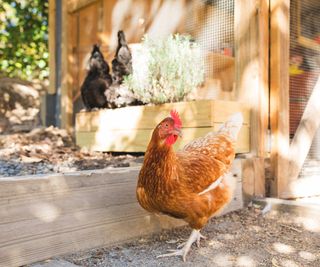
Finally, but by no means least, don't underestimate your own power when it comes to protecting your chickens from garden predators.
'My flock loves to peck and scratch around my half-acre outer run, but it is not secure. The eight-foot fence around the area is four feet of wire fencing with 2x4 inch openings topped by four feet of bird netting,' says Randy.
'It contains the chickens but would not deter an even slightly determined predator. Thus, the birds are only allowed to play in this area when I’m home and paying attention. Otherwise, they’re either in their secure runs or in the very secure coop.'
FAQs
What predator kills chickens at night?
If you're wondering what predator kills chickens at night, it might alarm you to know just how many possible culprits there could be. Cats and dogs may seem like unlikely chicken predators, but they’re the most common – mainly because ‘wherever there are people, there are cats and dogs,’ says Randy Graham of Randy's Chicken Blog.
While well-fed pets might not always pose a threat, he adds that cats are ‘unpredictable’ and have been known to kill even full-grown chickens. Dogs, on the other hand, can be trained to see your flock as part of their pack – ‘my chickens are also his chickens,’ as one keeper puts it – but the real danger often comes from ‘your neighbour’s dog, or the dog that belongs to those annoying people down the street.’ And that’s just the start.
Suburban chickens may face raccoons, coyotes, or even skunks, while rural flocks might have to contend with foxes, bobcats, and birds of prey. As Randy warns, ‘They’d happily take out my entire flock in a few minutes if they got into my coop.’
Which predators pose the biggest threat to backyard chickens?
When it comes to the predators that pose the biggest threat to backyard chickens, it's tempting to think large – like bears, coyotes, fisher cats, or bobcats. As author, TV star, and fifth generation chicken keeper Lisa Steele underlines, though, your flock is at a far greater risk of falling prey to small predators like weasels and rats.
'The small predators are actually the hardest to protect against. A weasel or rat can squeeze into the tiniest of spaces and will eat eggs, baby chicks, and even full-grown chickens, if given the opportunity,' she says.
'Aerial predators are also difficult to guard your flock against because it's illegal to harm or shoot at hawks, eagles and owls. So providing the chickens objects to hide underneath is often the best bet.'
Don't forget to cover the top of the run with the same fencing material, as this will prevent predators from simply climbing the fence, not to mention prevent aerial attacks from raptors.
'If you don’t fence the top of the run, you can string wires across the top of the run to deter raptors, or drape bird netting for the same purpose,' adds Randy. The same advice will be useful for other garden poultry, too, especially if you're thinking about keeping ducks.
While it takes time and effort to learn how to keep chickens safe from garden predators, your feathered friends will absolutely thank you for your hard work – and reward you with a delicious supply of eggs, too.
Sign up to the Homes & Gardens newsletter
Design expertise in your inbox – from inspiring decorating ideas and beautiful celebrity homes to practical gardening advice and shopping round-ups.

Kayleigh Dray is an experienced writer and editor within the world of digital journalism. She writes for Homes & Gardens on a range of gardening topics, from chicken keeping to landscape design. She is currently giving her own backyard a woodland-inspired makeover – and there have been whispers of a vegetable plot, too.
You must confirm your public display name before commenting
Please logout and then login again, you will then be prompted to enter your display name.
-
 How to clean a balcony in 5 simple steps – refresh yours and enjoy the spring sunshine with our expert guide
How to clean a balcony in 5 simple steps – refresh yours and enjoy the spring sunshine with our expert guideFrom railings to furniture, experts reveal how to bring your balcony back to life
By Andy van Terheyden Published
-
 Melanie Martinez designed the most playful home I've seen this season – designers say her color palette is brave yet sophisticated
Melanie Martinez designed the most playful home I've seen this season – designers say her color palette is brave yet sophisticatedThe singer makes the case for pink with her fun yet inviting home, which features bursts of natural materials and neutrals to keep it balanced
By Hannah Ziegler Published